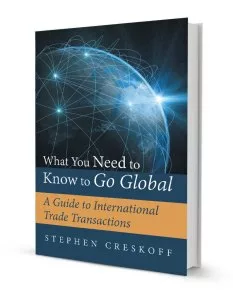 What You Need to Know to Go Global: A Guide to International Transactions by Stephen Creskoff is a must-read for any small- to medium-sized business wanting to compete in world markets. It truly answers the question, “How do I go international with my business?” through stories and practical advice that will help you understand the “how” and the “why”—not simply the “what.” As one reviewer said, “What You Need to Know to Go Global is an invaluable tool for anyone trying to understand and overcome the challenges of international trade.”
What You Need to Know to Go Global: A Guide to International Transactions by Stephen Creskoff is a must-read for any small- to medium-sized business wanting to compete in world markets. It truly answers the question, “How do I go international with my business?” through stories and practical advice that will help you understand the “how” and the “why”—not simply the “what.” As one reviewer said, “What You Need to Know to Go Global is an invaluable tool for anyone trying to understand and overcome the challenges of international trade.”
Here, Stephen, who is a lawyer and expert on international trade, talks about his book (with Laurie McCabe with the market research and consulting firm SMB Group that focuses on small-and mid-sized businesses):
Only a small percentage of U.S. SMBs do business outside of the United States. So, first of all, why do you think this is?
Stephen: Well, this is just what the case is today, and it’s unfortunate because SMBs are very competitive internationally. They need to think more about their position in global markets. The statistics tell us that, in terms of trade and goods, only about 23 percent of U.S. GDP is in trade and goods, and about the same for trade and services, and this is very low—the lowest for any developed economy. So, our small businesses often are not aware of the international opportunities for them.
Why should more SMBs think about doing business beyond U.S. borders?
Stephen: Well, first, let me talk about services. Our economy is about 80 percent services, and a lot of those which are tradeable, and we’re extremely competitive internationally with our services businesses. We export more services than any other country in the world by far and we have a very favorable surplus in trade and services, so this is important. The politicians don’t talk about that, but this is an area of international trade where we’ve been very successful. And then, of course, about 94 to 95 percent of world population is outside the U.S., so there are all sorts of opportunities for small businesses, whether it’s services providers or if they have a tangible product. So, there are great opportunities that should not be ignored.
What are the risks to ignoring the potential?
Stephen: First, what you don’t know can hurt you. If you’re not aware of how your product is situated internationally, an international competitor can come into the U.S. market and eat your lunch, so to speak. So, you have to be aware. You have to evaluate your product or service for the international market and for the global economy, no matter how small you are.
Do you have a few examples of creative ways SMBs have gone into new markets?
Stephen: Well, first of all, it’s like domestic business. It’s all about people. It’s about meeting people, developing a personal relationship and telling them about your product or service. You can do this at international trade shows. You can do this through visits, as you do, of course, for domestic clients. And, of course, there are government resources, which are valuable. The U.S. Commerce Department and Small Business Administration have excellent resources. And last but maybe most important, are the new Internet platforms that have been developed that open up all sorts of potential for international business. It’s probably an exception about my point about meeting the people, because now you can actually put up your goods or services on an Internet platform and start engaging with prospects in new countries through that.

